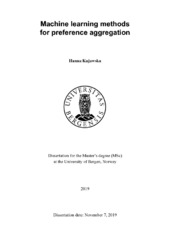Machine learning methods for preference aggregation
Master thesis
Permanent lenke
https://hdl.handle.net/1956/21000Utgivelsesdato
2019-11-14Metadata
Vis full innførselSamlinger
- Master theses [205]
Sammendrag
Preference aggregation is the process of combining multiple preferences orders into one global ranking. The top-ranked alternative is called the winner. Many aggregation methods have been considered in the literature. Some methods, like Borda count, require polynomial time, with respect to the input, to find the winner. For others, like for the Kemeny and Dodgson methods, the winners are computationally hard to compute. We explored experimentally if machine learning algorithms can be used to predict the winner of Borda, Kemeny and Dodgson voting rules, effectively trading computational complexity for (in)accuracy. Machine learning models were trained using two datasets: a real-world Spotify dataset and a synthetic dataset, both of profiles of size N = 20 alternatives and V = 25 voters. Four different methods for converting profiles into data sets were considered. The experimental study compared several supervised machine learning models (among others XGBoost, Gradient Boost, Support Vector Machine, Stochastic Gradient Descent (SGD) classifiers). Using less than 0.1% of all the possible profiles for the training set, models were found that predict: (i) Borda winner with the XGBoost classifier with accuracy of 100%, (ii) Kemeny winner(s) with the SGD classifier with 85% accuracy ; and (iii) Dodgson winner(s) with the Gradient Boost classifier with 89% accuracy
